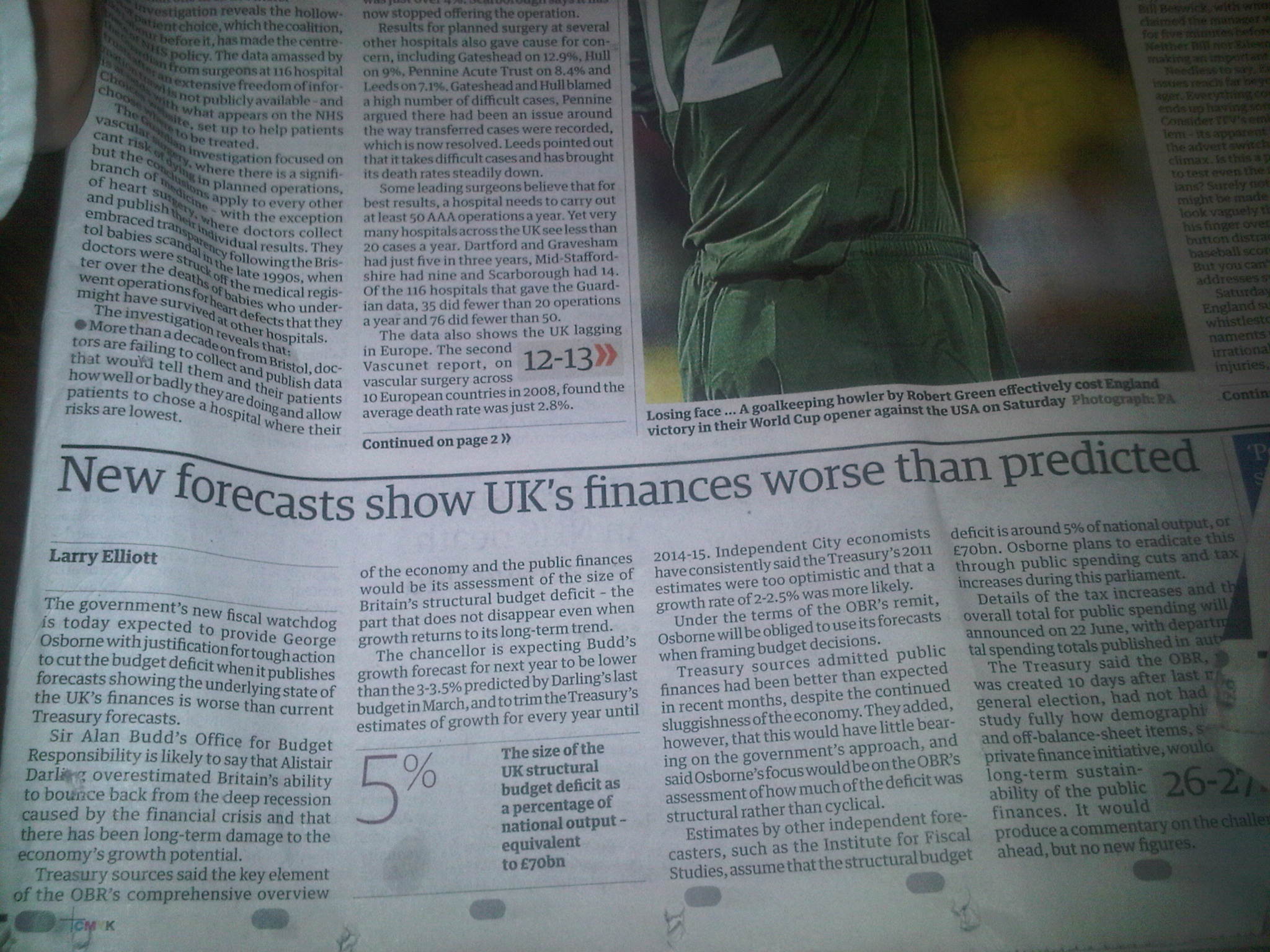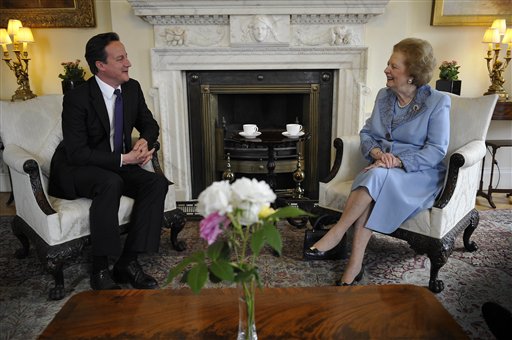12th July, 2010
Sir Alan Budd recently announced his intention to step down as interim boss of the Office for Budget Responsibility. Labour howled its derision – suggesting Budd’s resignation reflects internal tension; the Treasury did not allow him the independence that was hailed from the Coalition rooftops.
But we’re assured that that’s not the problem. There is no problem. He was only ever a temporary chief, and he came magnanimously out of retirement to set the office up; now he’s going back into retirement, as planned.
So we’re told, and the BBC’s Stephanie Flanders believes it, so who am I to question it? It is certainly true that this was only ever a three-month contract. But I will say this, two months ago Sir Alan Budd declared the new appointment was “the most exciting challenge of [his] professional life.”
Never mind the leader, there are some questions we can legitimately ask of the OBR itself. If it is genuinely independent – and that was the point of creating it – why is it housed inside the Treasury? Why are its members appointed by the Chancellor? Why do they report directly to the Chancellor?
The Treasury is trying to tell us the OBR is independent, but that it needs to be privy to ‘budget secrets’, and therefore it must have ‘a close working relationship’ with the Treasury.
It’s independence, then, but not as we know it.
Presumably it’s the same independence that prompted the OBR to rush out revised employment figures minutes before Prime Minister’s Questions so that Cameron had some ammunition in his back pocket with which to defend Harriet Harman’s attacks on the job losses. Poor Harman was left flapping in the wind, armed only with the figures produced by the OBR the day before; she might have been forgiven for thinking an independent OBR would have tipped her off in the same way as it tipped off Cameron, but no. And we all might have been forgiven for thinking that an independent OBR might have produced comparative figures on a like-for-like basis, but (as it now turns out) no.
A friend of mine in finance says that’s just politics. Labour hid the numbers from the Opposition when it was in power; I should only expect the same of the ConDems. But the economy is now the issue of our times, and the independence of the OBR is a key element of the Coalition’s justification for its choices.
They repeatedly say their cuts are “unavoidable” and that the independent OBR backs them up. On 7 June, David Cameron said the OBR would “show the scale of the problem we are in today”. (It didn’t really, as I have commented, but that didn’t stop Cameron claiming that it did.) The narrative is all. There’s an almighty mess, the narrative goes, and if it’s anyone’s fault, it’s not ours – it’s Labour’s.
For instance, the Education Secretary, Michael Gove, has cancelled 700 school building programmes. He may be sorry about having issued erroneous lists of the damned, but for the the decision itself, he is unapologetic.
“You’re right, there are some buildings which are in a shocking state, and I wish that we could invest in improving them, but the reason that we can’t is because the Labour government… Ed, Alistair Darling and Gordon Brown left us in this dreadful position…. This is Labour’s legacy….We are the people clearing up the mess…” (BBC Newsnight)
The mystery is that we are buying the narrative. We aren’t complaining. We aren’t rioting in the street. The British people and our political pundits are in a weird post-General Election funk; licking our World Cup wounds, still hungover from the will he, won’t he? of Wimbledon. We’re in a coma. We’re in Ashes to Ashes except that the 1980s and the 2010s are starting to look horribly similar. While in this state, dear friends, do not drink, drive, or operate machinery.
The plain truth about the cuts is that they are too hard, too fast. They are going to cause serious short-term pain. And if the breadwinner in your house loses his or her job, or your school is one of those that’s falling down around your ears, that’s real short-term pain – with long-term consequences. Lost skills can be lost to the economy forever; broken dreams can throw an individual off-course for a lifetime. Real lives are not political footballs. The Class of 2010 is buggered before it even brings its books home from university, because the Class of 2009 is still looking for work. There are now 70 applicants for every graduate vacancy.
But even if you think some short-term ruining of lives might be worth it, the long-term gain is not going to happen. The economy will contract, and the OBR’s forecast growth will not materialise. Why? Because the government has bailed out of the UK, shouting “the ship has sunk and it’s Labour’s fault”. Yet it hopes private enterprise will jump on board, attracted by – what? Lower rates of corporation tax? Would you hope to make a profit selling in this market? Lower tax on profits – which is what CT is – doesn’t help you if there are no profits in the first place. Private enterprise looks to government for stability and security before it invests. I don’t think I’ve heard, in my lifetime, a government so negative about its own economy. (My finance friend assures me this is just the management of political expectation; trouble is, the private sector will be listening too.)
When the economy contracts, tax receipts will automatically fall. Outgoings on dole and benefits will automatically rise, no matter how mean-spirited the regime, as hundreds of thousands lose their jobs. Less income for the government, and more expenditure. That means a bigger deficit. The “unavoidable” choices of this government are just going to make everything worse.
Who says the cuts are too hard and too fast? Well, obviously Labour, but then they would, wouldn’t they?
But then what about the world’s largest bond house, Pimco? (Don’t forget it was supposed to be the markets who were going to destroy us if we didn’t make these “unavoidable” cuts.)
“There are parts of Europe where austerity wasn’t called for immediately,” Scott Mather, Pimco’s head of global portfolio management, said, using the UK and Germany as examples.
He said a double-dip recession in Europe was a “growing risk” and maintained that Pimco’s “underweight position” on both the pound and the euro was justified. (Telegraph, 2 July 2010)
What about the CBI? (Don’t forget, the CBI is the donkey that hee-haws dutifully every time the Tories flick their whip.)
The CBI said of the recent additional emergency cuts the move was “disappointing” and called on George Osborne to give capital spending a higher profile in the second half of the parliament.
“Capital investment is crucial to driving the economy forward and the government needs to make sure we get back to the long-run average of 2.25% of national income as soon as possible.” (Guardian, 4 July 2010)
What about the nation’s Finance Directors, 40% of whom are now fearing a double-dip recession?
What about the CIPD predicting 3m unemployed by the end of the year?
What about the Chartered Institute of Purchasing & Supply? Their latest services survey shows that business expectations dropped to a 15-month low in the single biggest month-on-month fall ever recorded.
Does any of this sound to you like a world you’d want to invest in? Would you buy shares in UK plc with these guys on the board?
I thought not. So, back to the OBR: I’m confused by its forecasts.
The OBR is still predicting overall employment growth despite the dramatic reductions in the public sector. This means the private sector will have to grow not just well, but like it has never grown before. For the OBR to be right, the private sector will have to generate two million jobs in the next five years – an unprecedented number.
Go figure. Or, like Sir Alan Budd, go retire.
The OBR’s credibility is in pieces, and with it the credibilty of the ConDems’ economic position. The economic innocence the ConDems tout round town is disingenuous. But it doesn’t seem to matter. This is a government running a sweet line in “not me, guv” and, so far, getting away with it.
Nor does it matter who runs the OBR next, because the thing is a misnomer. It exists not to create responsibility, but to enable the Coalition – by appealing to ‘independent’ figures – to shirk it. It is the Office for Blame Reduction, an instrument of hypnotic induction. Under the guise of innocent cleaners, sweeping up an inherited mess, the ConDems are dismantling the welfare state, conducting a rapacious assault on the nation, all for the sake of some ideological small-state credo.
If – or rather, when – it doesn’t work, that’ll be some Other Bugger’s Responsibility.


 complaint online about Newsnight’s poor production values, and Paxman’s chairmanship of the Labour leaders’ debate. Ed Balls was surprisingly winning. Andy Burnham was cruelly described online as looking like a Thunderbird puppet (Troy!). Diane is Diane, and if you like her, you’ll still like her after that performance – but if you don’t, you’ll be feeling unmoved. Ed M looked like somebody’s younger brother, and I know how that feels. David Miliband is the next leader, that is very clear. At one point he spoke, quite effortlessly, on behalf of the whole panel. He’s just got it.
complaint online about Newsnight’s poor production values, and Paxman’s chairmanship of the Labour leaders’ debate. Ed Balls was surprisingly winning. Andy Burnham was cruelly described online as looking like a Thunderbird puppet (Troy!). Diane is Diane, and if you like her, you’ll still like her after that performance – but if you don’t, you’ll be feeling unmoved. Ed M looked like somebody’s younger brother, and I know how that feels. David Miliband is the next leader, that is very clear. At one point he spoke, quite effortlessly, on behalf of the whole panel. He’s just got it.
